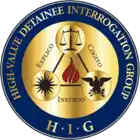High-Value Detainee Interrogation Group
The High-Value Detainee Interrogation Group (HIG) is a U.S. three-agency intelligence-gathering entity that brings together intelligence professionals from the Federal Bureau of Investigation (FBI), the Central Intelligence Agency (CIA), and the United States Department of Defense (DoD).[6][7] It is administratively housed within the FBI's National Security Branch.[8]
| High-Value Detainee Interrogation Group | |
|---|---|
 Seal of the High-Value Detainee Interrogation Group | |
| Active | August 2009 – present[1] (14 years) |
| Country | United States |
| Agency | Federal Bureau of Investigation Central Intelligence Agency Department of Defense |
| Part of | National Security Branch (administrative) |
| Abbreviation | HIG |
| Commanders | |
| Current commander | Lawrence Buckley[2] |
| Notable commanders | Eli Miranda[3] George Piro[4] |
The HIG was created by President Barack Obama in August 2009 with its charter written in April 2010.[9][10] It was established to question terrorism suspects soon after their arrests, to quickly obtain information about accomplices and terrorism threats.[10]
The group was to be responsible for interrogations overseas.[11] In January 2010, the Director of National Intelligence Dennis Blair said that the group would begin interrogating people in the U.S. as well.[11] The HIG claims to use authorized, lawful, non-coercive techniques and conducts research on the effectiveness of interrogation techniques and provides training for their interrogators, other U.S. Intelligence Community and law enforcement partners and allies abroad.[7]
The HIG is administered by the FBI.[6] The Director of the HIG is an FBI representative with two deputies, one from the DoD and the other from the CIA.[6] The HIG is subject to oversight by the National Security Council, the Department of Justice, and by Congress.[6][10]
The group's creation stopped a bureaucratic war between the CIA and the FBI over who had responsibility for interrogations.[9][12]
HIG questioned Faisal Shahzad, a Pakistani-American citizen responsible for the 2010 Times Square car bombing attempt,[10] Boston Marathon bombing suspect Dzhokhar Tsarnaev,[13] and Benghazi terror suspect Ahmed Abu Khattala.
References
- "History and Evolution". Federal Bureau of Investigation. August 28, 2010. Retrieved August 16, 2022.
- "Lawrence Buckley ('07) appointed Director of the High-Value Detainee Interrogation Group". The Institute of World Politics. February 19, 2021. Archived from the original on February 27, 2021. Retrieved August 16, 2022.
- "Eli S. Miranda Named Special Agent in Charge of the Honolulu Field Office". FBI.gov. Archived from the original on January 13, 2023. Retrieved September 12, 2019.
- "George Piro Named Special Agent in Charge of the Miami Field Office". FBI.gov. Archived from the original on April 29, 2023. Retrieved January 18, 2023.
- "Detainee Interrogation Chief: Waterboarding Doesn't Work". February 12, 2016. Archived from the original on April 29, 2023. Retrieved May 10, 2021.
- "High-Value Detainee Interrogation Group". FBI. Retrieved December 8, 2019.
- "Symposium Facilitates Exchange of Research on Lawful Interrogations: Event Sponsored by Government's High-Value Detainee Interrogation Group". FBI. October 27, 2015. Archived from the original on January 2, 2016.
- "National Security Branch Brochure" (PDF). Federal Bureau of Investigation. Retrieved August 16, 2022.
- Kornblut, Anne E. (August 24, 2009). "Obama Approves New Team to Question Key Terror Suspects". The Washington Post. Retrieved January 23, 2010.
- Kimberly Dozier (June 3, 2010). "WH adviser: Interrogation team questions Shahzad". Associated Press. Retrieved May 21, 2010.
- Hsu, Spencer S.; Agiesta, Jennifer (January 21, 2010). "Intelligence Chief says FBI was Too Hasty in Handling of Attempted Bombing". The Washington Post. Retrieved January 23, 2010.
- Barnes, Ed (May 12, 2010). "Elite High Value Interrogation Unit Is Taking Its First Painful Steps". Fox News.
- McKelvey, Tara (April 24, 2013). "Boston bombings: How to interrogate a suspected terrorist". BBC News. BBC. Retrieved April 24, 2013.
